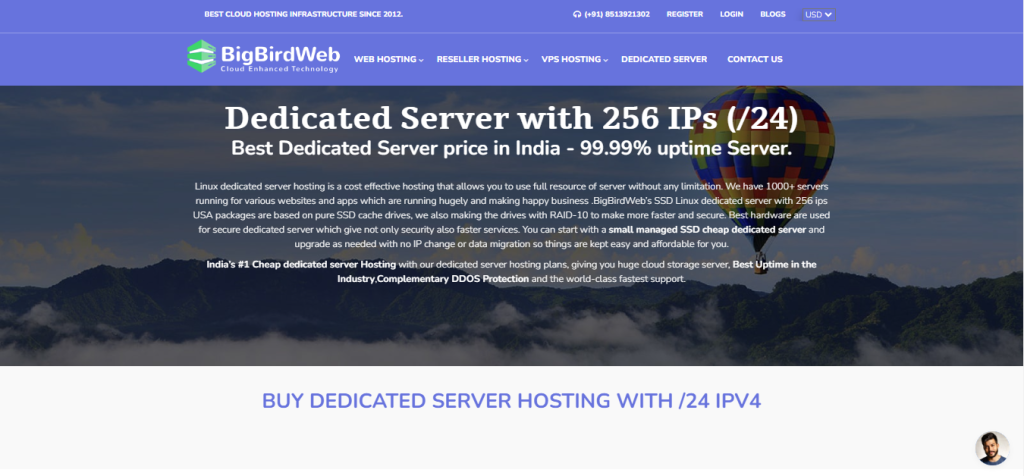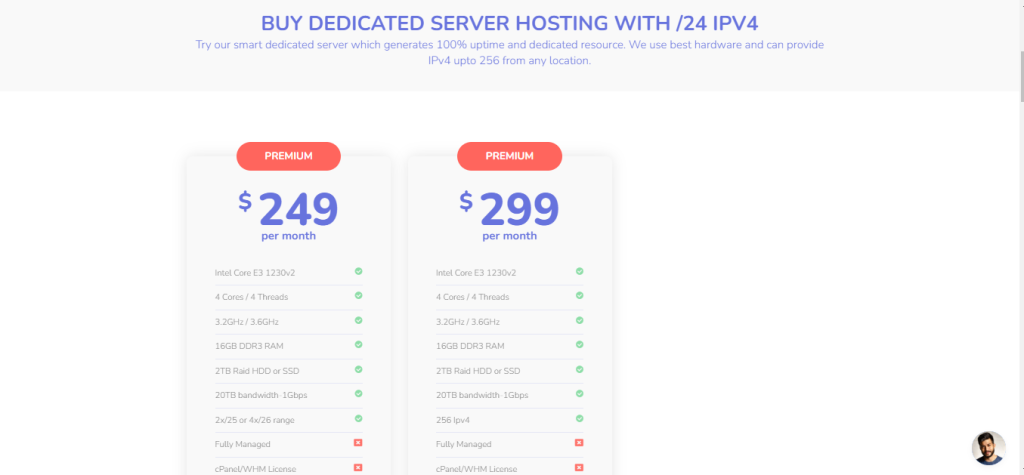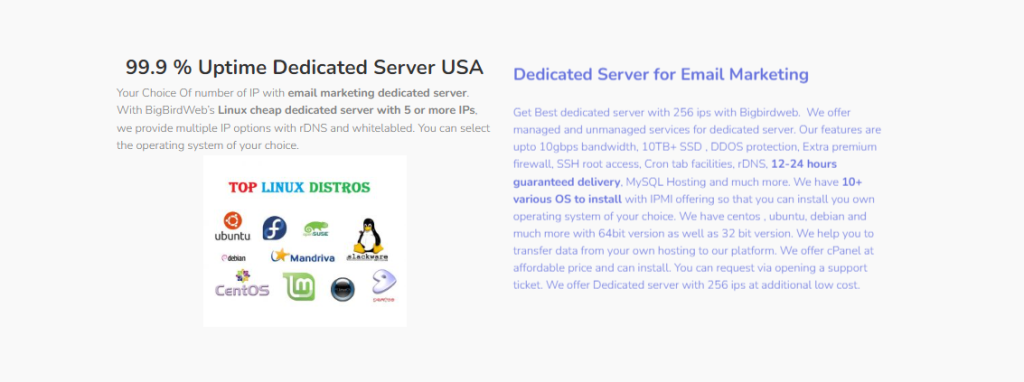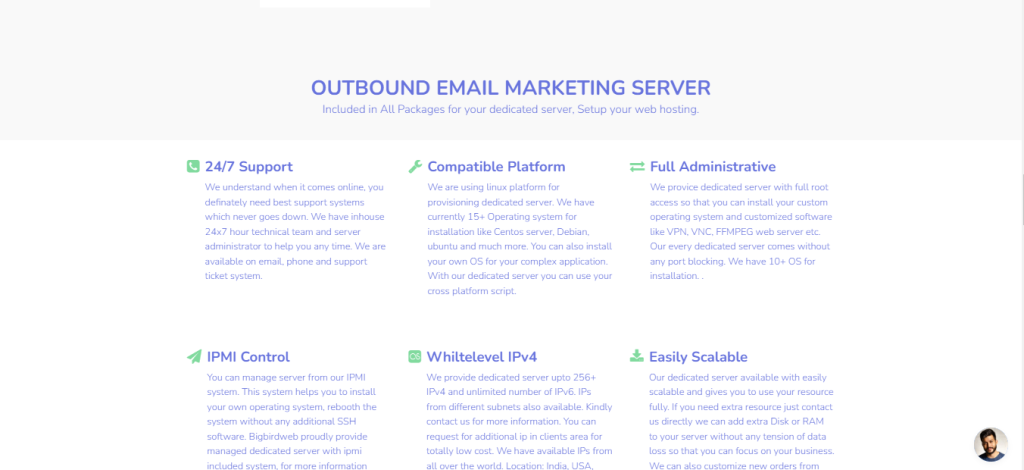Understanding these benefits of a dedicated server is crucial for making an informed decision that aligns with your company’s needs. This comprehensive guide will explore how having 256 IPs in a dedicated server setup can significantly enhance your business operations, from boosting security to optimizing SEO and improving network management.
Table of Contents
What is a Dedicated Server with 256 IPs?

A dedicated server with 256 IPs is a powerful, single-tenant server used by one client. It exclusively uses all server resources, ensuring high performance and reliability. When we talk about a dedicated server with 256 IPs, we refer to a server with a /24 IPv4 subnet, which provides 256 unique IP addresses.
1. Enhanced Security
One of the most significant benefits of a dedicated server with 256 IPs is enhanced security. Here’s how it helps:
1.1. Isolation and Segmentation
With 256 unique IPs, you can isolate and segment different aspects of your business. For instance, you can assign separate IPs to different applications or services. This segmentation helps in minimizing the impact of any potential security breaches. If one IP is compromised, it does not affect the others, thus safeguarding the overall system. You can also opt for free web hosting.
1.2. Improved DDoS Protection
Distributed Denial of Service (DDoS) attacks can overwhelm your server with traffic, causing it to crash. Having 256 IPs allows for better distribution of traffic, making it more challenging for attackers to target a single IP. By distributing your services across multiple IP addresses, you can enhance your dedicated server’s resilience against such attacks.
1.3. Better Firewall Management
With multiple IPs, you can set up more granular firewall rules. This means you can apply different security policies to different IP addresses, providing a more customized defence mechanism. For instance, you can restrict access to certain IPs based on the sensitivity of the data they handle, thereby reducing the risk of unauthorized access.
2. Better SEO Performance

Another crucial advantage of a dedicated server with 256 IPs with 256 IPs is improved SEO performance. Here’s how it works:
2.1. Avoiding IP Blacklisting
Search engines monitor IP addresses for suspicious activities. If you share an IP address with other websites, you risk being associated with potentially harmful activities that could lead to blacklisting. A dedicated server with 256 IPs helps you avoid this risk by allowing you to have a clean, dedicated IP for each of your domains or projects.
2.2. Enhanced Site Reputation
Search engines favour websites with good reputations. A dedicated server with multiple IPs ensures that each site on the server maintains its own reputation. This separation prevents one site’s negative reputation from affecting the others, helping you maintain a positive SEO standing.
2.3. Improved Local SEO
For businesses targeting specific geographical locations, having multiple IPs can be beneficial. You can assign different IPs to different regional websites or subdomains, making it easier to optimize them for local searches. This approach can improve your site’s visibility in local search results.
3. Improved Network Management

Network management becomes more efficient with a dedicated server featuring 256 IPs. Let’s delve into the specifics:
3.1. Efficient Load Balancing
A dedicated server with 256 IPs allows for efficient load balancing. By distributing traffic across multiple IP addresses, you can prevent any single IP from becoming overwhelmed. This balanced distribution enhances overall performance and ensures smoother operation, even during peak traffic times.
3.2. Easier IP Management
Managing multiple IP addresses can be streamlined with a dedicated server. You can categorize and allocate IPs based on different services or departments within your organization. This segregation simplifies network administration and helps in troubleshooting network issues more effectively.
3.3. Flexible Network Architecture
With 256 IPs at your disposal, you have the flexibility to design your network architecture according to your specific needs. Whether you need to set up complex internal networks or host multiple websites with unique IP addresses, a dedicated server provides the necessary flexibility to accommodate these requirements.
4. Other Advantages of a Dedicated Server with 256 IPs

Beyond the core benefits mentioned, a dedicated server with 256 IPs offers additional advantages:
4.1. Scalability
As your business grows, so do your networking needs. A dedicated server with 256 IPs provides ample room for expansion. Whether you need to add more services or host additional websites, having a large pool of IPs ensures that you can scale your operations without the need for immediate infrastructure upgrades.
4.2. Improved Email Deliverability
Email deliverability can be improved with a dedicated server. By assigning unique IPs to different email services, you can better manage your email reputation. This separation reduces the risk of being flagged as spam and enhances the chances of your emails reaching the intended recipients.
4.3. Customizable DNS Management
Having multiple IPs allows for more precise DNS management. You can set up DNS records for different services and applications, ensuring that each one is appropriately configured. This control over DNS settings can improve the performance and reliability of your online services.
FAQs
Q1: What is the difference between a dedicated server and a shared server?
A dedicated server is used exclusively by one client, offering complete control and better performance. In contrast, a shared server hosts multiple clients, leading to shared resources and potentially lower performance.
Q2: How does having 256 IPs improve security?
With 256 IPs, you can isolate different services and applications, making it harder for attackers to target the entire system. It also allows for more customized firewall rules and better protection against DDoS attacks.
Q3: Can a dedicated server with 256 IPs improve my website’s SEO?
Yes, a dedicated server with 256 IPs can help avoid IP blacklisting and maintain a good reputation for each site. It also allows for better local SEO by assigning different IPs to regional websites.
Q4: How does load balancing work with multiple IPs?
Load balancing distributes traffic across multiple IPs, preventing any single IP from becoming overloaded. This results in better performance and reliability during high traffic periods.
Q5: Is it difficult to manage a dedicated server with 256 IPs?
While managing a dedicated server with 256 IPs requires some technical expertise, the benefits in terms of security, SEO, and network management often outweigh the complexity. Many hosting providers offer management services to assist with this.
Bonus Content
Tips for Maximizing the Benefits of Your Dedicated Server with 256 IPs
- Regular Monitoring: Keep an eye on the performance and security of each IP address to ensure optimal operation.
- Regular Updates: Ensure that all software and services on your dedicated server are up-to-date to protect against vulnerabilities.
- Professional Management: Consider employing a network specialist or utilizing managed services to handle complex configurations and maintenance tasks.
By understanding and leveraging the benefits of a dedicated server with 256 IPs, businesses can significantly enhance their security, SEO, and network management capabilities. This comprehensive guide should serve as a valuable resource for making informed decisions about your server infrastructure.
Bonus Content: Advanced Strategies to Maximize the Benefits of a Dedicated Server with 256 IPs
Having a dedicated server with 256 IPs is a powerful asset for any business. However, to fully harness the benefits of a dedicated server, it’s essential to implement advanced strategies that can optimize its use. In this bonus section, we’ll explore how to maximize the potential of your dedicated server with 256 IPs, focusing on areas such as advanced security practices, enhanced SEO techniques, efficient network management, and innovative use cases.
1. Advanced Security Practices
Security is a top priority for businesses that rely on dedicated servers. With 256 IPs, you have the flexibility to implement advanced security measures that go beyond standard practices. Here’s how you can elevate your server’s security:
1.1. IP Whitelisting and Blacklisting
One of the most effective ways to secure your dedicated server is through IP whitelisting and blacklisting. By whitelisting trusted IP addresses, you can restrict access to your server, ensuring that only authorized users can connect. Conversely, blacklisting suspicious or known malicious IPs can prevent unauthorized access and mitigate the risk of attacks.
1.2. Intrusion Detection and Prevention Systems (IDPS)
With a dedicated server hosting multiple IPs, deploying an Intrusion Detection and Prevention System (IDPS) is crucial. IDPS monitors network traffic across your IPs and detects suspicious activities, such as unauthorized access attempts or data breaches. By setting up IDPS on different IP addresses, you can provide comprehensive coverage and quickly respond to potential threats.
1.3. Multi-Factor Authentication (MFA) Across IPs
Multi-Factor Authentication (MFA) adds an extra layer of security by requiring users to verify their identity through multiple methods. Implementing MFA across your dedicated server’s IPs ensures that even if one authentication method is compromised, the additional layers protect your server from unauthorized access.
2. Enhanced SEO Techniques
SEO is a dynamic field, and having a dedicated server with 256 IPs provides unique opportunities to optimize your website’s search engine ranking. Here are some advanced SEO strategies to consider:
2.1. IP Geotargeting
If your business operates in multiple regions, you can assign specific IPs to different geographical locations. This strategy, known as IP geotargeting, allows you to tailor content and keywords to specific regions, improving your site’s local SEO performance. Search engines will recognize the regional focus of your IPs, boosting your visibility in local search results.
2.2. Diversified Link Building
Backlinks play a crucial role in SEO, but building too many links from a single IP can raise red flags with search engines. With 256 IPs, you can diversify your backlink profile by hosting multiple websites and linking them strategically. This approach creates a natural backlink structure that enhances your site’s credibility and avoids potential penalties.
2.3. Optimizing Multiple Sites for Different Niches
If your business targets multiple niches, you can create separate websites on different IPs, each optimized for a specific niche. This segmentation allows you to tailor content, keywords, and SEO strategies to each niche, improving your overall online presence. Search engines will index each site independently, increasing your chances of ranking well across various niches.
3. Efficient Network Management
Effective network management is key to getting the most out of your dedicated server. With 256 IPs, you can implement sophisticated network management strategies that enhance performance, reliability, and scalability.
3.1. Traffic Segmentation and Prioritization
By assigning specific IPs to different types of traffic, you can segment and prioritize network traffic based on its importance. For instance, you can allocate dedicated IPs for mission-critical applications, ensuring they receive priority bandwidth. This approach minimizes latency and ensures that essential services operate smoothly, even during peak usage periods.
3.2. Redundancy and Failover Configuration
Redundancy and failover are critical components of a robust network management strategy. With multiple IPs, you can configure failover systems that automatically switch to backup IPs in case of a failure. This setup minimizes downtime and ensures continuous service availability, providing a seamless experience for your users.
3.3. Dynamic IP Allocation
Dynamic IP allocation allows you to assign and reassign IP addresses based on current network demands. This flexibility is particularly useful for businesses that experience fluctuating traffic patterns. By dynamically allocating IPs, you can optimize resource usage, balance server load, and respond quickly to changing network conditions.
4. Innovative Use Cases for a Dedicated Server with 256 IPs
Beyond the traditional uses of a dedicated server, there are several innovative ways to leverage the power of 256 IPs. These use cases can add significant value to your business operations.
4.1. Hosting Multiple E-commerce Platforms
E-commerce businesses often require separate platforms for different product lines or regions. With 256 IPs, you can host multiple e-commerce websites on a single dedicated server. Each platform can have its own IP, SSL certificate, and security settings, ensuring that your customers have a safe and reliable shopping experience across all sites.
4.2. Deploying Virtual Private Networks (VPNs)
VPNs are essential for businesses that require secure remote access to their networks. With a dedicated server and multiple IPs, you can deploy multiple VPNs for different departments or remote offices. This setup allows for secure, encrypted connections, ensuring that your sensitive data remains protected while enabling remote work.
4.3. Running Multiple Test Environments
Developing and testing new software requires isolated environments to avoid conflicts with live applications. A dedicated server with 256 IPs allows you to set up multiple test environments, each with its own IP. This isolation ensures that testing does not interfere with your production environment, enabling faster development cycles and reducing the risk of errors.
4.4. Providing Web Hosting Services
If you’re in the web hosting business, a dedicated server with 256 IPs is an ideal solution for offering premium hosting services. You can allocate specific IPs to different clients, ensuring that each client has a dedicated IP address. This arrangement enhances security, improves site performance, and provides a higher level of service to your customers.
5. Scalability and Future-Proofing
Scalability is a critical factor for growing businesses. With a dedicated server and 256 IPs, you have the foundation for scalable operations that can evolve with your business needs.
5.1. Gradual Expansion
As your business grows, you can gradually expand your server’s capabilities without the need for immediate infrastructure upgrades. The availability of multiple IPs allows you to add new services, websites, or applications as needed. This scalability ensures that your dedicated server remains adaptable to your changing requirements.
5.2. Preparing for IPv6 Transition
The global transition to IPv6 is inevitable, but IPv4 addresses remain relevant for many businesses. By leveraging your dedicated server’s IPv4 addresses, you can continue to operate efficiently while preparing for a future transition to IPv6. This approach allows for a smooth, phased migration that minimizes disruption to your operations.
5.3. Building a Resilient Infrastructure
Resilience is key to maintaining uninterrupted service. By using a dedicated server with 256 IPs, you can build a resilient infrastructure that can withstand various challenges, from traffic spikes to cyberattacks. This resilience ensures that your business remains operational under adverse conditions, protecting your reputation and revenue streams.
6. The Economic Impact of a Dedicated Server with 256 IPs
Investing in a dedicated server with 256 IPs is a strategic decision that can have a significant economic impact on your business. Here’s how:
6.1. Cost-Effective Resource Allocation
With a dedicated server, you can allocate resources more efficiently, reducing the need for additional hardware or services. The ability to host multiple sites or services on a single server reduces overhead costs and streamlines operations, making your IT infrastructure more cost-effective.
6.2. Revenue Generation Opportunities
Having 256 IPs opens up new revenue generation opportunities, especially for businesses in the web hosting or IT services sectors. You can offer premium services, such as dedicated IP hosting or secure VPNs, to your clients, creating additional income streams that contribute to your bottom line.
6.3. Long-Term ROI
The initial investment in a dedicated server with 256 IPs may be substantial, but the long-term return on investment (ROI) is significant. Enhanced security, improved SEO, efficient network management, and the ability to scale operations all contribute to a higher ROI over time. By strategically leveraging your dedicated server, you can achieve sustained growth and profitability.
Conclusion: Unlocking the Full Potential of Your Dedicated Server with 256 IPs
The benefits of a dedicated server with 256 IPs extend far beyond basic hosting. By implementing advanced security practices, enhancing SEO strategies, optimizing network management, exploring innovative use cases, and planning for scalability, you can unlock the full potential of your dedicated server. This comprehensive approach ensures that your server not only meets your current needs but also supports your future growth and success.
